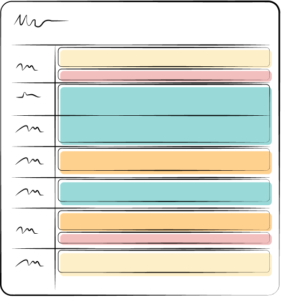

Time blocking is the practice of dedicating each moment of your day to a specific purpose. Under time blocking a typical day in your calendar will look like this:

If the lack of open space in that day makes you feel claustrophobic just focus on the green. In time blocking you include the personal (in green) as well the professional to make sure they get the time they deserve.
Time blocking isn’t new. Benjamin Franklin, an early kite enthusiast and productivity guru, used it back in the 1700s. Today it is used by people like Bill Gates, Elon Musk and other high profile individuals.
But you don’t have to be famous to benefit from adopting the strategy.
According to Cal Newport, author of Deep Work:
A 40 hour time-blocked work week, I estimate, produces the same amount of output as a 60+ hour work week pursued without structure.
Time blocking forces you to be realistic about how much time you have and how much you can achieve.
It encourages the inclusion of personal time in your work schedule. This deliberate allocation of time away from your desk reduces stress and can make you more productive in the long run.
Time blocking can save you from the old “Work expands to fill the time available” trap. By setting a predetermined time to complete a task you can leverage the deadline effect and finish the task in just the time you set for it.
Lastly, in the big picture, time blocking can help keep you moving forward on your big goals. Seeing your days and weeks filled edge to edge with other work and activities will force you to schedule in the time your goals need and deserve.
You can start time blocking one day at a time. Start it tonight. Start it now! Spend 15 minutes or so deciding on where tomorrow’s time will go.
You might want to leave little gaps – buffers – between blocks just in case things don’t go according to plan.
And things won’t go according to plan. There will be crises and hiccups that will impact your time blocking. Don’t sweat it. Having your time laid out will help you roll with the punches and keep moving forward.
It might not be for you. If your job is more on the reactive side – completing requests as they come in – you might think there is no point in time blocking. It can still help with building a balanced work-life schedule. And as Cal Newport suggests, try adding a secondary goal to those blocks of time where you are responding to requests. This will give you something to work on and keep you progressing during any downtime.

It wasn’t a real tomato. It was a kitchen timer shaped like a tomato. Very kitsch, but it was the…

Why and how to do a time audit If you find yourself chronically short of time. If you find yourself…

Listen, you might have seen articles, hundreds of articles, on how multitasking is evil. That stance is ill-informed. It’s an…

This productivity strategy comes from a late 18th century French writer, Nicholas Chamfort. His advice has been translated, misquoted and…
It does the math so you don't have to. It keeps track of your projects, what you need to do, how much time you have, and when they’re due. When you finish a task Pepy suggests what to work on next based on your priorities so all your projects get the love they need.